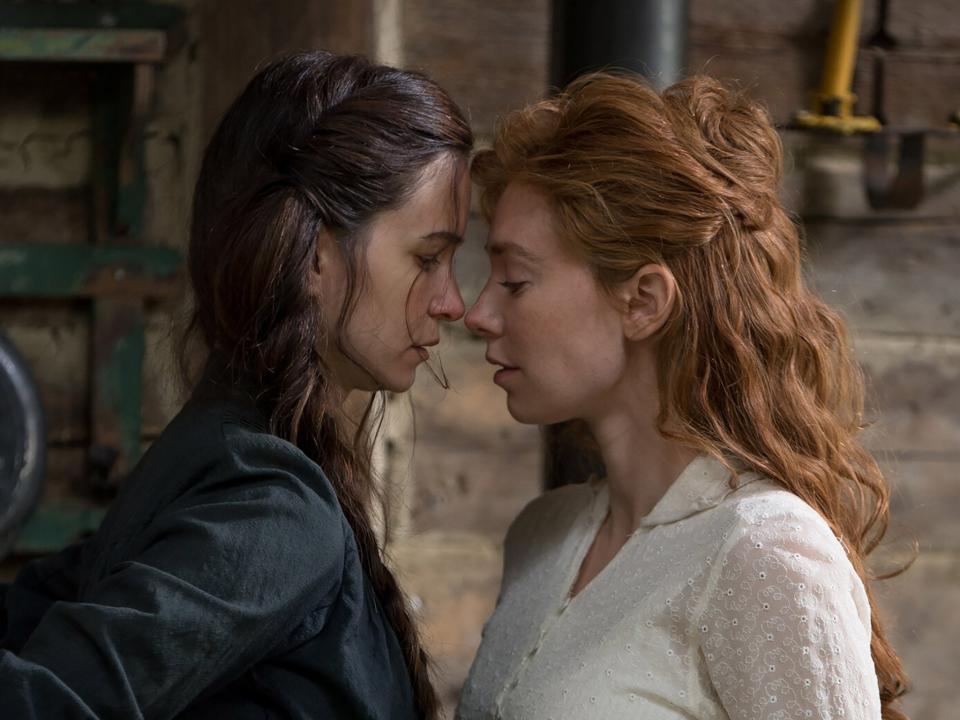The World to Come, review: A delicate frontier drama that celebrates female desire wrestling to be free
Dir: Mona Fastvold. Starring: Starring: Katherine Waterston, Vanessa Kirby, Christopher Abbott, Casey Affleck. 15, 95 mins.
In The World to Come, a meditative frontier drama from director Mona Fastvold, Vanessa Kirby is transformed into one of Rossetti’s flame-haired maidens. Her clothes may look deceptively humble, but she has a proud chin and a delicate curve to her lips. Kirby’s Tallie, who arrives with her husband Finney (Christopher Abbott) to settle in a remote farm, is a vessel of promise. She is the paradise that Abigail (Katherine Waterston) finds amongst the harsh and barren lands of 19th century Schoharie County. Kirby’s performance is thrillingly, seductively, alive –The World to Come is to watch how a humble-mannered Waterston electrifies in her presence as she falls wildly in love.
Fastvold’s framing, too, is both painterly and sharply intuitive. It celebrates female desire wrestling to be free of its cage. Ron Hansen and Jim Shepard’s script, adapted from the latter’s story of the same name, is a subtle and delicate piece of writing. It avoids the most obvious assumptions about the era. These women’s lives are, for the most part, occupied by hard, simple work and neighbourly pleasantries. For a long time, it feels as if no one really minds the growing intimacy between Tallie and Abigail – the way they’ll scarper off into a corner for a moment alone or, when both couples are together, they’ll divert the conversation to their own fancies.
Life here is defined largely by a sense of dullness, both intellectual and emotional. Abigail hopes that the purchase of an atlas, and the education it might bring, will help her escape the four cabin walls of her limited existence. The love that grows between her and Tallie – well, that is a joy so rare and precious that it seems to have sprung from the earth itself. Abigail may be an amateur poet, but what they share lies beyond simple words.
Fastvold – who had a hand in writing Brady Corbet’s The Childhood of a Leader and Vox Lux, two pristine portraits of authoritarianism and capitalism – knows how to spin wider metaphors out of intimate, personal desires. Their relationship comes to represent the struggles of every woman who has tried to follow her heart and mind, not society’s demands. Oppression in The World to Come doesn’t always have to speak its name. It can live merely as a threat, as an ever-present reminder that any act too bold or individual will result in retaliation.
Both Tallie and Abigail are childless, the latter having lost a daughter a year before. Their husbands have allowed their own disappointments to settle like a thick blanket of aimless resentment. Neither will act violent or abusive out in the open, but the fear that any day could bring a turn in them hangs cruelly in the air. The question here is why Casey Affleck was motivated to spearhead this project, not only producing the film, but starring as Abigail’s largely taciturn and sad-eyed husband, in light of the accusations of sexual harassment made by two women who worked on the set of his 2010 film I’m Still Here (the actor settled two sexual harassment lawsuits out of court). His presence adds an unintended unease to the narrative.

Tallie and Abigail’s love is forced to exist only in the realms of promise, in this fabled “world to come”. That hope is echoed in the golden streaks of light cinematographer Andre Chemetoff uses to break through the chill of the homestead and in Daniel Blumberg’s expressive jazz score. The women of The World to Come choose not to wilt in the face of impermanence, but embrace it ferociously, whatever the consequence.
Read More
The Last Letter from Your Lover, review: A classic tale of doomed love – thankfully, it knows it
Old, review: A provocative horror that brings out the best and worst in M Night Shyamalan
The Croods: A New Age review: The wholesome, zany sequel nobody asked for

 Yahoo News
Yahoo News 
